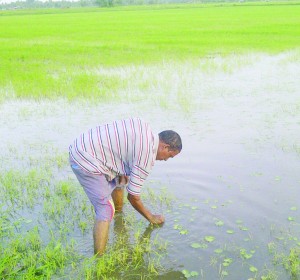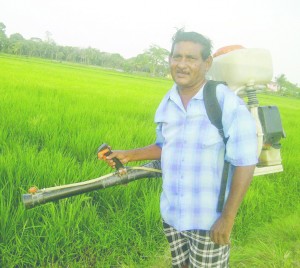
Just when farmers from Airy Hall on the Essequibo Coast thought they were in the clear after the December conservancy breach, which flooded the community and destroyed several acres of rice, some are now faced with another major challenge.
This time, strange “green looking” worms are responsible for their heartache. The “heart worm” pest, as it is being called, is stunting rice fields, which were replanted following the flood. Farmers are now uncertain as to when they will reap their crop, which is presently 20 days old.
Approximately 20 farmers whose rice lands are located close to the conservancy are facing the infestation. They are clueless how the worms, living particularly in the middle of the young plants, got into their fields and are uncertain of a possible remedy.
One farmer, Bhagwan Parbhu, whose 10 acres of land is situated north of the conservancy, told Guyana Times International: “I re-sow very well, but my plants are so stunted. I give it several days and still they are not picking up. I used several insecticides, tried many measures, still one thing – they not growing.”
Strange infestation

He said he noticed several weeks after re-sowing that his plants were not showing any signs of growth. The father of six said he then decided to investigate, and he found tiny worms feeding on the insides of the young rice plants, causing them to yellow and drop. The farmer, who said he has been in the business for more than 20 years, said he has never faced such a situation previously.
The frustrated farmer explained that he took a loan from the bank and was now faced with many expenses, trying to save his rice plants. His brother, Sonu, whose plot is nearby, said his crop was also severely affected. He added that he too treated his crop with insecticide, but progress is slow.
Another farmer who said only a few of his acres are affected by the “heart worms” is spraying continuously, hoping that the problem will be eradicated.
The farmers are calling for “scientific” help from the Agriculture Ministry. They said a sample of the plants needs to be tested by a plant pathologist so that appropriate measures can be taken to arrest the unknown infestation.
The “heart worm” infestation was reported to officers of the Guyana Rice Development Board (GRDB) and inspections were conducted in the fields.



